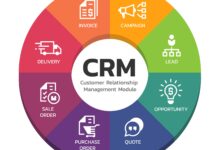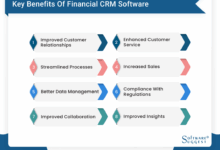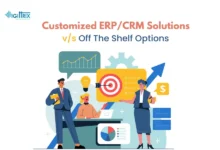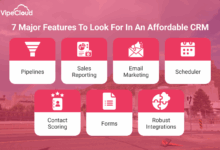Best CRM For Real Estate Agents: Enhancing Productivity And Client Relationships
With Best CRM for Real Estate Agents at the forefront, this paragraph opens a window to an amazing start and intrigue, inviting readers to embark on a storytelling journey filled with unexpected twists and insights. In the fast-paced world of real estate, having the right CRM can make all the difference in managing clients, boosting efficiency, and closing deals effectively. Let’s delve into the essential features, customization options, integration capabilities, mobile accessibility, data security, pricing models, and training & support strategies that can elevate your real estate business to new heights.
Importance of CRM in Real Estate
Customer Relationship Management (CRM) systems play a crucial role in the success of real estate agents and businesses. These platforms are designed to help agents effectively manage their client relationships, improve communication, and streamline various processes.
Enhanced Customer Engagement
- CRM systems allow real estate agents to track interactions with clients, ensuring personalized communication and timely follow-ups.
- By maintaining detailed client profiles and preferences, agents can provide tailored services and recommendations, leading to higher customer satisfaction.
- Automated reminders and notifications help agents stay organized and prompt in their responses, enhancing overall customer engagement.
Improved Lead Management
- CRM systems enable agents to capture, qualify, and prioritize leads efficiently, ensuring no opportunity is missed.
- Centralized lead databases help agents track lead sources, conversion rates, and performance metrics to optimize their marketing strategies.
- Automated lead nurturing processes save time and effort, allowing agents to focus on high-potential leads and closing deals.
Streamlined Communication
- CRM platforms facilitate seamless communication through integrated email, phone, and messaging tools, ensuring agents can easily connect with clients and team members.
- Collaborative features enable effective team coordination, real-time updates, and shared access to client information, enhancing productivity and service delivery.
- Customizable communication templates and workflows help maintain consistency in messaging and branding across all client interactions.
Key Features to Look for in a CRM for Real Estate Agents
When it comes to choosing a CRM system for real estate professionals, there are several key features that can make a significant difference in managing client relationships, automating tasks, and ultimately improving productivity and sales.
Lead Management
Lead management is a crucial feature that allows real estate agents to track, organize, and prioritize leads effectively. A good CRM should provide tools for capturing leads, assigning them to agents, and nurturing them through the sales pipeline.
- Ability to capture leads from multiple sources such as websites, social media, and email campaigns.
- Automated lead assignment based on predefined criteria such as location, property type, or lead source.
- Lead scoring to prioritize leads based on their likelihood of conversion.
- Integration with third-party lead generation tools for seamless lead management.
Task Automation
Automation tools in a CRM system can save real estate agents valuable time by streamlining repetitive tasks and workflows. This feature is essential for increasing efficiency and ensuring that no leads or follow-ups fall through the cracks.
- Automated email and SMS notifications for follow-ups, appointments, and reminders.
- Scheduled drip campaigns to nurture leads and stay top of mind with clients.
- Automated data entry and updates to eliminate manual input and ensure data accuracy.
- Workflow automation for tasks such as property listing updates, contract management, and client communication.
Integration with Real Estate Platforms
A CRM system that integrates seamlessly with popular real estate platforms can enhance the overall efficiency of an agent’s workflow. Integration allows for easy access to property listings, market data, and client information all in one place.
- Integration with MLS platforms for quick access to property listings and market trends.
- Syncing with real estate websites for automatic updates on property status and availability.
- Integration with virtual tour and video platforms for showcasing properties to clients remotely.
- Seamless integration with accounting and document management systems for a complete real estate solution.
Customization Options in CRM for Real Estate
Customization plays a crucial role in the efficiency and effectiveness of a CRM system for real estate agents. Tailoring the CRM to specific needs and workflows can greatly enhance productivity and streamline operations in the real estate industry.
Significance of Customizable Fields
Customizable fields in a CRM for real estate agents allow for the adaptation of the system to match the unique requirements of individual agents or agencies. By creating custom fields, agents can capture and track data that is relevant to their specific business processes, ensuring that the CRM aligns perfectly with their operations.
- Custom fields can include details such as property preferences, client priorities, or specific transaction stages.
- Agents can segment leads based on custom criteria, allowing for targeted marketing and personalized communication.
Enhanced Productivity with Tailored CRM Solutions
Tailored CRM solutions can significantly boost productivity in real estate workflows by providing agents with tools and features that align with their unique business needs. Examples of how customization can enhance productivity include:
- Automating repetitive tasks specific to real estate transactions, such as sending follow-up emails or scheduling property showings.
- Integrating third-party apps for seamless data syncing and enhanced functionality within the CRM system.
Impact of Personalized Dashboards
Personalized dashboards in a CRM system for real estate agents offer a comprehensive view of key metrics and performance indicators, tailored to individual preferences. These dashboards can:
- Provide quick access to essential information, such as upcoming appointments, lead status, and sales pipeline.
- Allow agents to customize dashboard widgets based on their priorities and objectives, improving decision-making and resource allocation.
Setting up Custom Fields in a CRM System
Setting up custom fields in a CRM system for real estate involves a straightforward process that allows agents to define the specific data points they want to capture and track. This typically includes:
- Accessing the CRM settings or customization tab to create new custom fields.
- Defining the field type (e.g., text, number, date) and setting any validation rules or dependencies as needed.
Benefits of Integrating Third-Party Apps
Integrating third-party apps with a customized CRM for real estate agents can offer a range of benefits, including:
- Enhanced data connectivity and synchronization between different platforms for a seamless user experience.
- Access to specialized tools and services that complement the core CRM functionalities, such as email marketing or document management.
Importance of Data Segmentation
Data segmentation within a personalized CRM for real estate professionals allows agents to categorize and target leads more effectively. Segmentation can help in:
- Creating personalized marketing campaigns based on client preferences and behavior.
- Improving lead nurturing and conversion rates by delivering relevant content and offers to specific segments.
Automated Workflows in a Customized CRM
Automated workflows in a customized CRM for real estate agents streamline routine tasks and processes, reducing manual effort and minimizing errors. These workflows can:
- Automate lead assignment and follow-up tasks, ensuring timely responses and engagement with clients.
- Trigger notifications and reminders for critical milestones in the sales process, keeping agents informed and proactive.
Creating Personalized Templates in CRM System
Creating personalized templates in a CRM system for real estate management involves a step-by-step process that allows agents to standardize communication and documents. The steps may include:
- Accessing the template editor within the CRM interface to design custom layouts for emails, reports, or contracts.
- Adding merge fields for dynamic content insertion, such as client names or property details, to personalize templates for each recipient.
Integration Capabilities of CRMs for Real Estate
In the real estate industry, seamless integration of CRM systems with other tools is crucial for optimizing workflow efficiency and enhancing productivity for agents.
Streamlining Processes with CRM Integrations
Integrating CRM with various tools used in real estate can significantly streamline processes for agents. For example, syncing CRM with email platforms allows agents to track client interactions effectively and ensures timely responses to inquiries. Additionally, integrating CRM with calendars helps in scheduling appointments and managing tasks efficiently.
Advantages of CRM Integrations
The advantages of having a CRM that syncs with email, calendars, and marketing platforms are numerous. It enables agents to have a centralized database of client information, streamline marketing campaigns, and automate repetitive tasks. This integration ensures that agents can provide personalized services to clients and maintain strong relationships.
Specific CRM Integrations for Real Estate Professionals
Some specific CRM integrations that have proven beneficial for real estate professionals include integration with popular email services like Gmail or Outlook, integration with calendar tools like Google Calendar, and integration with marketing platforms such as Mailchimp or HubSpot. These integrations help agents stay organized, communicate effectively, and track marketing efforts seamlessly.
Setting up and Configuring CRM Integrations
Setting up CRM integrations with third-party applications involves identifying the tools to integrate, configuring the settings within the CRM system, and establishing data synchronization protocols. Agents need to ensure that the integration process is smooth and that data flows seamlessly between the CRM and external tools.
Enhancing Lead Management and Client Communication
Data synchronization between CRM and external tools plays a vital role in enhancing lead management and client communication. By having all relevant information in one place, agents can effectively nurture leads, track interactions, and provide timely updates to clients. This streamlined process helps in improving conversion rates and fostering long-term relationships with clients.
Challenges in Integrating CRM Systems with Real Estate Software
While CRM integrations offer numerous benefits, there are potential challenges that may arise. These challenges include technical compatibility issues, data security concerns, and the complexity of setting up multiple integrations. Agents need to be aware of these challenges and work closely with IT professionals to overcome any obstacles during the integration process.
Mobile Accessibility and CRM for Real Estate
Mobile accessibility in CRM for real estate agents is crucial in today’s fast-paced market. With the increasing reliance on smartphones and tablets, having a mobile-friendly CRM application enables agents to stay connected and productive while on the go.
Improved Responsiveness and Efficiency
- Real estate agents can quickly respond to leads, inquiries, and client requests from anywhere, at any time, using their mobile CRM. This leads to better customer service and higher client satisfaction.
- Agents can access property listings, client information, and important documents on their mobile devices, allowing them to work efficiently without being tied to a desk.
- Mobile CRM apps often include features like push notifications, reminders, and calendar integration, helping agents stay organized and on top of their tasks.
Impact on Decision-Making
- Real-time data access through mobile CRM solutions enables agents to make informed decisions quickly. They can access market trends, property information, and client preferences on the go, leading to more strategic decision-making.
- Having instant access to critical information through mobile CRM apps empowers agents to negotiate effectively, close deals faster, and seize opportunities as they arise.
- Agents can collaborate with team members, share updates, and track progress in real-time through mobile CRM platforms, enhancing communication and decision-making processes.
Data Security and Privacy in Real Estate CRM
Data security is a critical aspect of CRM systems used by real estate professionals as they handle sensitive client information. Ensuring the privacy and protection of this data is essential for maintaining trust and complying with regulations.
Importance of GDPR Compliance
- GDPR compliance is crucial for real estate CRM systems to protect the personal data of clients.
- Implementing GDPR standards helps in building transparency and accountability in data processing.
- Non-compliance with GDPR regulations can result in hefty fines and damage to the reputation of real estate agencies.
Best Practices for Data Privacy in Real Estate CRM
- Regularly update security protocols and software to prevent data breaches.
- Limit access to sensitive information to authorized personnel only.
- Provide training to staff on data protection procedures to maintain confidentiality.
Role of Encryption in Real Estate CRM Platforms
Encryption plays a vital role in safeguarding sensitive information by converting data into a secure code that can only be accessed with the appropriate decryption key.
Data Privacy Impact Assessment for Real Estate CRM Systems
- Identify the types of data collected and stored in the CRM system.
- Analyze potential risks and vulnerabilities in data handling processes.
- Evaluate the impact of a data breach on clients and the business.
Comparison of Data Security Features in Cloud-based vs On-premise CRM Systems
| Cloud-based CRM | On-premise CRM |
|---|---|
| Offers scalability and flexibility in data storage. | Provides greater control over data security measures. |
| Requires trust in the cloud service provider for data protection. | May require higher initial investment for security infrastructure. |
Pricing Models of CRM Software for Real Estate Agents
When it comes to choosing a CRM software for real estate agents, understanding the pricing models offered by different providers is crucial. The cost of CRM software can vary significantly based on various factors, so it’s important to compare pricing structures to find the most cost-effective solution without compromising on quality.
Factors Influencing Cost of CRM Software
- Number of Users: Most CRM software providers charge based on the number of users accessing the system. The more users you have, the higher the cost.
- Features and Functionality: Advanced features and customization options can increase the price of CRM software.
- Integration Capabilities: Integration with other tools and systems may come at an additional cost.
Comparison Table of Pricing Plans
| CRM Provider | Basic Plan | Standard Plan | Premium Plan |
|---|---|---|---|
| Provider A | $20/month/user | $30/month/user | $50/month/user |
| Provider B | $25/month/user | $40/month/user | $60/month/user |
| Provider C | $15/month/user | $35/month/user | $55/month/user |
Additional Costs to Consider
- Training: Training sessions for your team may require additional fees.
- Customization: Tailoring the CRM software to your specific needs can result in extra costs.
- Support: Access to customer support services beyond basic assistance may come at a price.
Assessing Your Specific Needs
Before selecting a CRM software for your real estate business, it’s essential to assess your specific needs and features required in a CRM system. Consider the size of your team, the level of customization required, integration with other tools, and the budget you are willing to allocate. By evaluating these factors, you can ensure you are investing in the right CRM solution that meets your business requirements effectively.
Training and Support for Real Estate Agents Using CRM
Training programs provided by CRM vendors play a crucial role in helping real estate agents effectively utilize CRM systems. These programs ensure that agents understand the functionalities of the CRM software and can leverage it to enhance their productivity and client relationships. Customer support is equally important as it assists agents in resolving any issues or queries they may have during the adoption and usage of the CRM system.
Key Components in a Comprehensive CRM Training Program
- Introduction to CRM features and benefits
- Hands-on training on data entry and management
- Guidance on lead tracking and client communication
- Customization options and advanced features overview
- Best practices for maximizing CRM efficiency
Common Challenges Faced by Real Estate Agents
- Lack of understanding of CRM functionalities
- Resistance to change from traditional methods
- Data migration and integration issues
- Inadequate training leading to underutilization of CRM
Interactive Training Methods for Enhanced Understanding
- Live webinars and virtual training sessions
- Interactive tutorials and guided exercises
- Role-playing scenarios for practical application
- Q&A sessions with CRM experts
Importance of Ongoing Support and Troubleshooting
- 24/7 customer support for immediate assistance
- Access to online resources and knowledge base
- Regular updates and training refreshers
- Dedicated support team for personalized guidance
Effective Utilization of CRM Tools
- Organize leads and contacts for efficient management
- Automate follow-ups and reminders for timely communication
- Create customized reports for performance tracking
- Utilize mobile access for on-the-go productivity
Comparison of Training Methods
- Self-paced online training offers flexibility but may lack real-time support
- In-person workshops provide hands-on experience but can be time-consuming
- A combination of both methods can cater to different learning preferences
User Interface and Experience in Real Estate CRM
User-friendly interfaces play a crucial role in the success of CRM software for real estate agents. A well-designed user interface enhances usability, simplifies navigation, and improves overall user experience, leading to increased productivity and efficiency in managing client relationships and transactions.
Comparison of CRM Platforms for Real Estate Agents
- Platform A: Offers a clean and intuitive interface with customizable dashboards for quick access to key information.
- Platform B: Features a user-centric design with drag-and-drop functionality for easy customization of layouts and workflows.
- Platform C: Focuses on mobile responsiveness and provides a seamless experience across different devices for agents on the go.
Impact of Intuitive UI on User Adoption
An intuitive user interface in CRM tools can significantly impact user adoption rates, as agents are more likely to embrace and actively use the system if it is easy to navigate and understand.
- Agents are more motivated to engage with the CRM platform, leading to better data input, tracking, and utilization for real estate transactions.
- A user-friendly interface reduces the learning curve for new users, enabling quicker onboarding and integration into daily workflows.
Reporting and Analytics Features in Real Estate CRM
Reporting and analytics are crucial features in a real estate CRM as they provide valuable insights and data to help agents make informed decisions and track performance effectively.
Customizable Reporting in Real Estate CRM
Customizable reporting features allow real estate professionals to tailor reports according to their specific needs and preferences. This flexibility enables agents to focus on key performance metrics and analyze data relevant to their business goals.
- Agents can create personalized reports to track sales performance, lead generation, client interactions, and marketing efforts.
- Customizable dashboards provide a snapshot of important metrics at a glance, making it easier to identify trends and areas for improvement.
- Users can set up automated reports to receive regular updates on key performance indicators, saving time and ensuring data is always up-to-date.
Integrated Analytics Tools in Real Estate CRM
Analytics tools integrated into CRM systems offer advanced capabilities to analyze data and gain meaningful insights for decision-making.
For example, predictive analytics can help real estate agents forecast market trends, identify potential leads, and optimize pricing strategies based on historical data.
- Agents can track website traffic, email campaigns, and social media engagement to evaluate the effectiveness of their marketing efforts and adjust strategies accordingly.
- Advanced reporting functionalities such as heat maps, conversion rates, and ROI analysis provide a deeper understanding of client behavior and preferences.
- Integration with third-party analytics platforms allows for cross-referencing data from multiple sources to create comprehensive reports and actionable insights.
Customer Relationship Management Strategies for Real Estate Agents
In today’s competitive real estate market, building strong client relationships is essential for success. Customer Relationship Management (CRM) systems can help real estate agents personalize communication, analyze client preferences, segment their database effectively, and integrate social media platforms to engage with clients and generate leads.
Personalized Communication Using CRM Systems
- Real estate agents can use CRM systems to track client interactions, preferences, and property interests, allowing them to send personalized messages, property recommendations, and follow-ups.
- By leveraging CRM data, agents can address clients by name, reference past conversations, and tailor communication based on client preferences, enhancing the overall client experience.
Data Analysis for Targeted Marketing
- CRM platforms enable real estate agents to analyze client behavior patterns, preferences, and buying habits to identify opportunities for targeted marketing campaigns.
- By utilizing CRM data analytics, agents can create personalized marketing strategies, send relevant property listings, and offer customized services to meet individual client needs.
Effective Client Database Segmentation
- With CRM tools, real estate agents can segment their client database based on criteria such as location, budget, property type preferences, and buying timeline to tailor their approach for each segment.
- Segmenting clients allows agents to provide targeted property recommendations, market updates, and relevant information, increasing client engagement and satisfaction.
Integration of Social Media Platforms
- Integrating social media platforms into CRM systems enables real estate agents to engage with clients on multiple channels, share property listings, promote open houses, and showcase success stories to attract potential buyers.
- By incorporating social media activities into CRM workflows, agents can nurture client relationships, generate leads, and expand their online presence to reach a wider audience.
Case Studies
In the real estate industry, successful implementation of CRM systems has transformed the way agents and agencies manage their relationships and transactions. Let’s explore some real-life examples of how CRM has benefited real estate professionals.
Case Study 1: XYZ Real Estate Agency
- XYZ Real Estate Agency faced challenges in tracking leads and managing client interactions efficiently.
- By implementing a CRM system, they centralized their data, streamlined communication, and automated follow-ups.
- As a result, XYZ Real Estate Agency saw a 30% increase in lead conversion rates and a 20% boost in customer retention.
Case Study 2: Jane Doe, Independent Real Estate Agent
- Jane Doe struggled to keep up with client preferences and deadlines without a centralized system.
- After adopting a CRM tailored for solo agents, Jane improved her response times, organized her tasks, and personalized client interactions.
- She witnessed a 40% increase in referrals and a 25% reduction in administrative tasks, allowing her to focus more on closing deals.
Best Practices Learned from Successful CRM Implementations
- Customize your CRM to fit your specific needs and workflows.
- Train your team thoroughly to maximize CRM utilization and adoption.
- Regularly analyze CRM data to identify trends, opportunities, and areas for improvement.
Key Performance Indicators (KPIs) for Measuring CRM Effectiveness
- Lead conversion rates
- Customer retention rates
- Average response time
Return on Investment (ROI) of CRM Implementation
- Calculate the cost savings from increased efficiency and reduced manual tasks.
- Track the revenue growth from improved lead management and customer relationships.
Comparison of CRM Software Options for Real Estate Businesses
- CRM A: Offers robust automation features tailored for large real estate agencies.
- CRM B: Focuses on personalized client interactions and lead nurturing for independent agents.
- CRM C: Provides a user-friendly interface and seamless integration with popular real estate platforms.
Step-by-Step Guide to Integrating CRM into a Real Estate Agency’s Workflow
- Assess your current workflows and identify pain points that CRM can address.
- Select a CRM software that aligns with your business goals and budget.
- Train your team on CRM usage and encourage adoption through incentives and support.
- Regularly review CRM performance and adjust configurations as needed to optimize results.
Future Trends in Real Estate CRM Technology
The real estate industry is constantly evolving, and with it, the technology used by professionals in the field. As real estate CRM software becomes more sophisticated, it is essential to stay informed about the emerging trends that are shaping the future of CRM for real estate agents.
AI and Machine Learning Integration
AI and machine learning are revolutionizing the way real estate agents interact with their clients and manage their business. These technologies have the potential to automate repetitive tasks, analyze large amounts of data for insights, and even predict future trends in the market. By integrating AI and machine learning capabilities into CRM solutions, agents can streamline their processes, personalize client interactions, and make data-driven decisions.
- AI-powered chatbots for instant customer support
- Machine learning algorithms for lead scoring and predictive analytics
- Automated property recommendations based on client preferences
Blockchain in Real Estate CRM
Blockchain technology offers a secure and transparent way to record transactions, contracts, and other important information in real estate. By leveraging blockchain in CRM systems, real estate agents can ensure the integrity and security of their data, streamline transaction processes, and build trust with clients through increased transparency.
Blockchain can revolutionize property transactions by providing a tamper-proof record of ownership, reducing fraud, and speeding up the closing process.
Virtual Reality and Augmented Reality Integration
Virtual reality (VR) and augmented reality (AR) are transforming the way properties are showcased and viewed by clients. By incorporating VR and AR features into CRM software, real estate agents can offer immersive virtual tours, interactive property visualizations, and enhanced remote viewing experiences for their clients.
- Virtual property showings for remote buyers
- Interactive 3D property models for detailed views
- Augmented reality overlays for property information and neighborhood details
End of Discussion
In conclusion, the Best CRM for Real Estate Agents offers a comprehensive solution to streamline your workflow, enhance customer relationships, and drive business growth. By leveraging the power of a tailored CRM system, real estate agents can stay ahead of the competition and achieve success in today’s dynamic market. Embrace the future of real estate management with the right CRM tool by your side.





